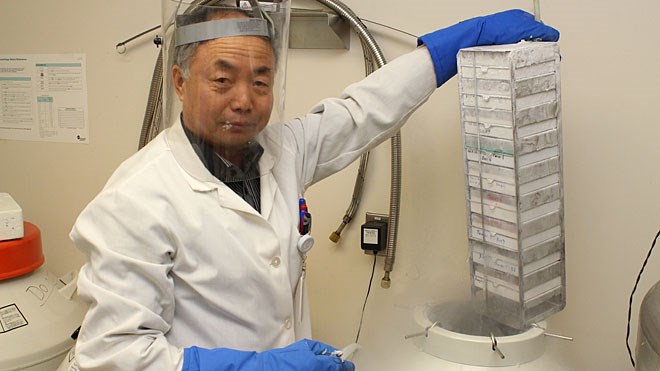The research team at Health Sciences North analyzed breast cancer tumour tissue samples, and discovered there is a correlation between the amount of RNA degradation and complete tumour destruction after treatment.
In other words, if a tissue sample had high-quality RNA after several rounds of chemotherapy, it meant the treatment was not very effective.
But a tissue sample with degraded, or disrupted RNA, after those same rounds of chemotherapy, meant the patient would be a good candidate to continue the therapy, since the tumour was being destroyed.
Those patients with high quality RNA could forgo the toxic side effects of continuing chemotherapy, and opt for surgery, radiation therapy, or other treatments instead.
A breast cancer patient will typically do six to eight rounds of chemotherapy to destroy the tumour. The Sudbury researchers have so far been able to conduct their RNA Disruption Assay test mid-treatment – at the third or fourth round of chemotherapy. The plan is to eventually be able to test closer to the first round of chemotherapy.
Dr. Ken Pritzker, Rna Diagnostics' president and CEO, has big plans for the company. He expects to generate $150 million in revenues by 2019.
“What we do see happening is that it would be seen as accepted as a standard worldwide,” he said. “The Sudbury facility will be the prototype and the central facility, but there will be other facilities elsewhere in the world. The economic benefit to Sudbury will be very substantial.”
Rna Diagnostics has already raised $1.1 million in venture capital to continue clinical trials for the test, improve automation of the process, and market the technology to key opinion leaders and clinicians around the world.
Rna Diagnostics also participated in NORCAT's inaugural Sudbury Pitch event, where the company asked for $1.5 million in venture capital to move technology forward.
Investors were impressed enough to invite Rna Diagnostics back to Sudbury for a followup meeting on May 27.
“We appreciate very much the support we have received to date from the Sudbury community,” Pritzker said.
Two recent academic papers have also played in the company's favour.
The first, published in the journal of Breast Cancer Research and Treatment, compared the RNA Disruption Assay test to other breast cancer diagnostic tools.
Rna Diagnostic's test emerged as the most promising technology, of the half dozen tested in the study.
The second paper, published in the journal of Endocrine-Related Cancer, described a study a pharmaceutical company called Armour Therapeutics did in conjunction with Rna Diagnostics.
Armour Therapeutics is developing a prostate cancer drug called AT-001. The study found the RNA Disruption Assay test is also effective at determining the effectiveness of their drug for prostate cancer treatment.
“From our viewpoint, this extends the spectrum of drugs whose response can be tested by RDA,” Pritzker said.
The study also means Rna Diagnostics could eventually apply its test to a wider variety of cancers, in addition to breast cancer.
Join Sudbury.com+
- Messages
- Post a Listing
- Your Listings
- Your Profile
- Your Subscriptions
- Your Likes
- Your Business
- Support Local News
- Payment History
Sudbury.com+ members
Already a +member?
Not a +member?
Sign up for a Sudbury.com+ account for instant access to upcoming contests, local offers, auctions and so much more.
